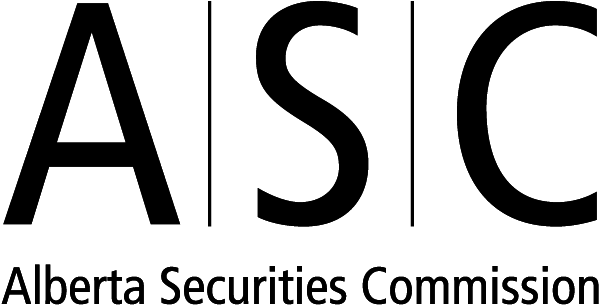About the ASC
The Alberta Securities Commission (ASC) is the regulatory agency responsible for administering the province's securities laws. Our mission is to foster a fair and efficient capital market in Alberta and to protect investors.
We aim to be a practical, intelligent, best-in-class regulator and we strive to protect investors from improper, misleading or fraudulent practices. The Securities Act (Alberta) ensures that Alberta’s capital market works for participants and that investors have timely, accurate information on which to base their investment decisions. It also ensures that those who sell securities in Alberta are registered and that they conduct themselves according to applicable laws and professional standards.
As a member of the Canadian Securities Administrators (CSA), the council of the securities regulators of Canada's provinces and territories, the ASC works to improve, coordinate and harmonize the regulation of Canada's capital market.
Alberta has the second largest capital market in Canada, representing 22 per cent of the Canadian capital market. Oil and gas companies represent 11 per cent of Canada’s capital market and Alberta-based companies have the second-highest average market capitalization in Canada, at $2 billion. Oil and gas and the utilities and pipeline industries represent 74 per cent of the total market capital in Alberta (49 per cent oil and gas, 25 per cent utilities and pipelines).
The ASC takes pride in understanding, supporting and working within Alberta’s important and unique capital market. We have a strong connection with our Alberta market participants. This understanding of Alberta’s unique business environment is critical to our role in providing a stable and intelligent regulatory environment.
For more information on Alberta’s capital market, please see the latest issue of the Alberta Capital Market Report.
The ASC is funded by the combination of revenues received under Alberta securities laws from market participants (e.g. fees) and its own investment income. The ASC does not receive any funding from taxpayers or the Government of Alberta.
As an industry-funded statutorily created corporation, the ASC is unlike other business corporations in that it does not have shareholders to whom the board of directors report. Instead, it is accountable to the Minister of Finance and, through the Minister, to the Alberta Legislature. As a public sector body the ASC complies with the Public Sector Compensation Transparency Act.
The ASC is authorized to:
- impose fines known as “administrative penalties” of up to $1 million per contravention of the Securities Act (Alberta), freeze assets and ban from the market those who breach the Act;
- stop companies or individuals from trading securities during an investigation;
- stop the trading in securities of a company if it fails to fulfill its obligations under Alberta securities laws; and
- pursue offenders in the Provincial Court of Alberta as an agent of the Crown, with the power to seek jail terms of up to five years less a day and fines of up to $5 million per offence committed.
The ASC is not authorized to:
- get money back for investors;
- offer investment or legal advice; or
- comment on any aspect of an investigation.
| 1955 - 1975 | In 1955, the Alberta Securities Commission was established to protect the public in its investments. During this time period, the ASC reports to the Attorney General of Alberta. |
|---|---|
| 1975 - 1992 | The ASC reports to the Alberta Minister of Consumer and Corporate Affairs. |
| 1979 | Starting in June of this year, the ASC holds commission meetings on a biweekly basis, alternating between Edmonton and Calgary. |
| 1988 | Alberta Legislative Assembly Bill 43 Alberta Securities Commission Reorganization Act requires that the ASC is to be restructured into two parts – the “Board” and the “Agency”. |
| 1992 - 2001 | The ASC reports to Alberta Treasury. |
| 1995 | Amendments to the Securities Act (Alberta) transform the ASC from a government agency into an industry-funded provincial corporation. The changes also grant the ASC the ability to make rules and provides enhanced enforcement powers. |
| 2001 - 2004 | The ASC reports to the Alberta Minister of Revenue. |
| 2003 | The ASC centralizes its operations in its Calgary office and closes its Edmonton office. |
| 2004 - 2012 | In 2004, the departments of Finance and Revenue are merged into a single ministry. The ASC reports to the Alberta Ministry of Finance. |
| 2012 - current | In 2012, the Ministries of Finance and Treasury Board and Enterprise were consolidated. The ASC currently reports to the Alberta Ministry of Treasury Board and Finance. |
The ASC is a member of the Canadian Securities Administrators (CSA). The CSA, the council of the securities regulators of Canada’s provinces and territories, co-ordinates and harmonizes regulation for the Canadian capital markets.
For more information about the CSA, please visit the CSA's website.
The ASC collaborates with a number of organizations as it works to fulfill its strategic plan.
The CSA and its members (Provincial/Territorial Securities Regulators)
- Canadian Securities Administrators (CSA)
National Cease Trade Order Database
CSA Disciplined List - British Columbia Securities Commission (BCSC)
- Financial and Consumer Affairs Authority of Saskatchewan
- Manitoba Securities Commission
- Ontario Securities Commission (OSC)
- Autorité des marchés financiers (AMF)
- Financial and Consumer Services Commission (New Brunswick)
- Nova Scotia Securities Commission
- The Office of the Superintendent of Securities, Prince Edward Island
- Service NL
- Office of the Superintendent of Securities, Government of the Northwest Territories
- Nunavut Securities Office
- Office of the Yukon Superintendent of Securities
National Filing Systems
- SEDAR (System for Electronic Document Analysis and Retrieval)
- SEDI (System for Electronic Disclosure by Insiders)
Other Industry Regulators
- Chartered Professional Accountants Alberta (CPA)
- Investment Industry Regulatory Organization of Canada (IIROC)
- Joint Forum of Financial Market Regulators
- Mutual Fund Dealers Association of Canada (MFDA)
Law Enforcement Agencies & Government
Canadian Stock Exchanges
Industry Resources
- Canadian Investor Protection Fund (CIPF)
- Canadian Securities Institute (CSI)
- Global Financial Innovation Network (GFIN)
- Investment Funds Institute of Canada (IFIC)
- Ombudsman for Banking Services and Investments






